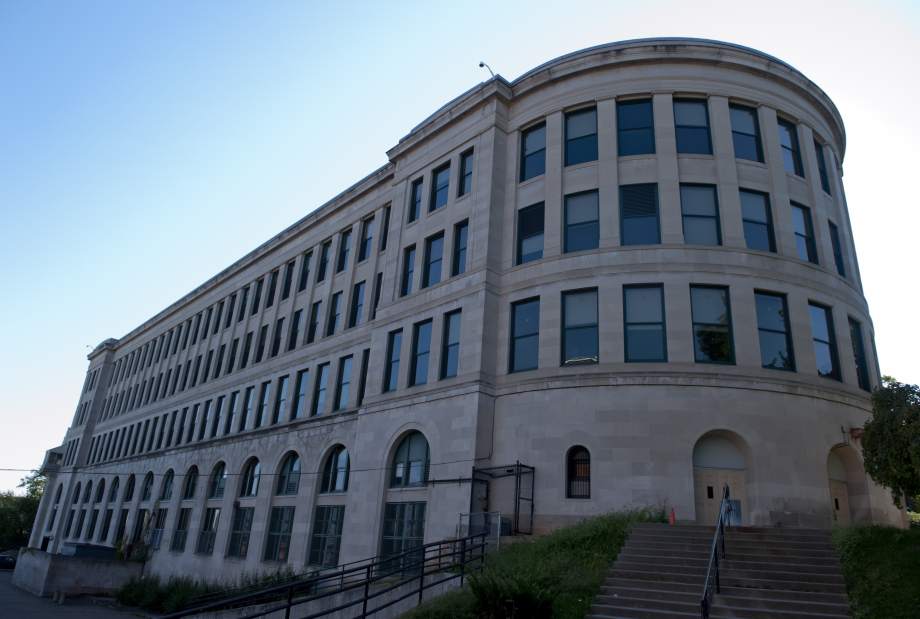https://archive.triblive.com/aande/books/book-tracks-the-fate-of-schenley-high-pittsburghs-first-public-high-school/
Book tracks the fate of Schenley High, Pittsburgh's first public high school

Andrew Russell | Trib Total Media
The former Schenley High School in Oakland.
When Schenley High School closed in 2011, many saw its demise as inevitable. The tacit reason for shuttering the school was that the cost of repairs to keep it open was more than the Pittsburgh School District could afford.
“The Schenley Experiment: A Social History of Pittsburgh's First Public High School” (Penn State Press, $19.95), makes the case that closing the school was more complex than any single issue.
“While I was researching it … people would say it was a conspiracy from the beginning or it was all about money for the district,” says author Jake Oresick. “I think on both sides it was misunderstood.”
Oresick, a 2001 Schenley graduate who is an attorney and public policy analyst, traces the history of school from its inception in 1916 to its controversial end. Through research and interviews with alumni, Oresick paints a picture of a high school that was unusual from the start.
When Schenley opened its doors more than 100 years ago, it was one of the first comprehensive high schools in the U.S. Its location in Schenley Heights on a ridge that overlooked Oakland, the Hill District, and Bloomfield — after other sites including the top of Negley Hill Road and the current location of West Penn Hospital were considered — was crucial to the school's success.
“It was like let's straddle two or three worlds,” Oresick says. “I think that was so important to the way the school ended up existing. Most of the time in America, it's de facto segregation because people live in a segregated way. We're not barring anyone from our schools, but everyone (different) lives too far away. So it was an accident of geography.”
The racial segregation that was present in so many high schools was absent at Schenley. Because of its proximity to the Hill District and its many ethnic enclaves, the school attracted a wide variety of students: black and white, and Jewish, Catholic, and Protestant, from all of Pittsburgh's diverse nationalities. While Schenley was far from perfect, Oresick writes it was “more tolerant than the city outside its walls,” an idea he backs up by way of interviews with numerous alumni.
“I think that's an important way to describe the school for a lot of its existence,” he says. “It certainly was never perfect, but … I think it's very meaningful.”
By the 1970s, Schenley's student body had lost its racial diversity and suffered academically. For the 1974-75 school year, 81.7 percent of the students were black and the school was noncompliant with the Pennsylvania Human Relations Commission's desegregation plan. In order to remedy the racial imbalance, Pittsburgh school superintendent Richard Wallace designed a series of innovations, including a teacher training laboratory and designating Schenley as a magnet school for International Studies, High Technology, Classical Studies and International Baccalaureate.
The parents of white students who had shunned the school started to line up to secure space for their children in the magnet programs. By 1986, Wallace had turned the school around, with President Ronald Reagan honoring Schenley with the Flag of Excellence during a ceremony at the White House Rose Garden.
But Schenley's renaissance was not permanent. The deteriorating conditions of the building necessitated repairs. Then-superintendent Mark Roosevelt insisted they were too costly, and a group of supporters insisted that cost analysis was wrong. Specifically, the removal of asbestos from the building was seen as prohibitively expensive. But Oresick found documents released in 2012 that proved the “plaster contained only trace amounts of asbestos” and that the cost of rehabbing the school was wildly overestimated.
The cost of asbestos removal was “under $2 million dollars and the district had been talking about $60 (million to $80 million,” Oresick says. “That was done in 2009, after the building had been closed. But they didn't tell anyone. … It was interesting that it came out in 2012 (during a radio interview with a contractor) when the district was trying to sell the building.”
Rege Behe is a Tribune-Review contributing writer.
Copyright ©2025— Trib Total Media, LLC (TribLIVE.com)
